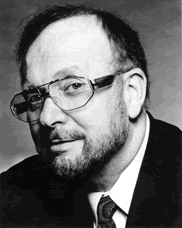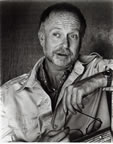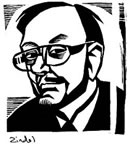1. How long did it take you to write The Pigman?
 It took me six months to write THE PIGMAN. It took me six months to write THE PIGMAN.

2. When did you start writing your first book?
 I started writing in high school for the school newspaper. My first book wasn't written until I was thirty. I started writing in high school for the school newspaper. My first book wasn't written until I was thirty.

3. How autobiographical is "The Pigman"?
 THE PIGMAN is so autobiographical. I wrote an autobiography about it called THE PIGMAN & ME. For any characters to come alive you have to put something of yourself into them--so a piece of the Pigman, and John, and Lorraine--is really me. THE PIGMAN is so autobiographical. I wrote an autobiography about it called THE PIGMAN & ME. For any characters to come alive you have to put something of yourself into them--so a piece of the Pigman, and John, and Lorraine--is really me.
 I used to love telling jokes and pulling pranks and wondering about everything from Life to Death. I played in graveyards and tasted chocolate covered ants and loved talking to animals at the zoo. I used to love telling jokes and pulling pranks and wondering about everything from Life to Death. I played in graveyards and tasted chocolate covered ants and loved talking to animals at the zoo.
 My son, David, loves doing a lot of the crazy things I did. He started talking with a monkey in a zoo in Berlin and it started screaming at him. My son, David, loves doing a lot of the crazy things I did. He started talking with a monkey in a zoo in Berlin and it started screaming at him.
 Even the graffiti in THE PIGMAN came from my own experience. It was written on a desk in one of the classrooms where I taught. "HELP ME! A ROTTEN SCIENCE TEACHER HAS GIVEN ME A DRUG TO TURN ME into a teeny, weenie tiny mosquito!" Even the graffiti in THE PIGMAN came from my own experience. It was written on a desk in one of the classrooms where I taught. "HELP ME! A ROTTEN SCIENCE TEACHER HAS GIVEN ME A DRUG TO TURN ME into a teeny, weenie tiny mosquito!"

4. What childhood experience influenced you to write this book?
 The childhood experiences, which influenced me to write this book, are well documented and reported in THE PIGMAN & ME. The childhood experiences, which influenced me to write this book, are well documented and reported in THE PIGMAN & ME.
 The book starts, "ATTENTION ANY KIDS WHO MAY READ THIS BOOK!!!!! Eight hundred and fifty-three horrifying things had happened to me by the time I was a teenager. That was when I met my 'Pigman,' whose real name was Nonno Frankie who taught me so many things." The book starts, "ATTENTION ANY KIDS WHO MAY READ THIS BOOK!!!!! Eight hundred and fifty-three horrifying things had happened to me by the time I was a teenager. That was when I met my 'Pigman,' whose real name was Nonno Frankie who taught me so many things."
 
5. What's your sequel to "The Pigman" about?
 The second book, THE PIGMAN'S LEGACY, is about John and Lorraine who walk past the Pigman's old house after he dies, and see someone in the window. At first they think it is a ghost, but then they go in and have another wild adventure with a terrific old guy! The second book, THE PIGMAN'S LEGACY, is about John and Lorraine who walk past the Pigman's old house after he dies, and see someone in the window. At first they think it is a ghost, but then they go in and have another wild adventure with a terrific old guy!
 THE PIGMAN & ME is a memoir I wrote, and I think you would really like that one because the story is true. It's a couple of years in my life when I was a boy, and about all the crazy things that happened to me. If you read that one you'll really understand why I became a writer. THE PIGMAN & ME is a memoir I wrote, and I think you would really like that one because the story is true. It's a couple of years in my life when I was a boy, and about all the crazy things that happened to me. If you read that one you'll really understand why I became a writer.

6. Why did you title the book "The Pigman"?
 I titled the book THE PIGMAN because some actor in Houston told me about a man in Boston who collected pigs. I thought that was a very unusual thing to do and I never forgot it. I titled the book THE PIGMAN because some actor in Houston told me about a man in Boston who collected pigs. I thought that was a very unusual thing to do and I never forgot it.
 I wanted to call it "Pardon Me, You're Stepping on My Eyeball!" My publisher preferred my title "The Pigman," so I used the other title a few years later on another book. I wanted to call it "Pardon Me, You're Stepping on My Eyeball!" My publisher preferred my title "The Pigman," so I used the other title a few years later on another book.

7. Do you own or collect pigs?
 I don't collect pigs. I've started to collect paperweights. I think the reason I don't collect material objects is because somebody will rip them off these days. I tend to invest my emotions in living people. That's tricky enough. I have a great paperweight from Sigmund Freud's house in Vienna and another from Stonehenge. I don't collect pigs. I've started to collect paperweights. I think the reason I don't collect material objects is because somebody will rip them off these days. I tend to invest my emotions in living people. That's tricky enough. I have a great paperweight from Sigmund Freud's house in Vienna and another from Stonehenge.

8. Were you like John growing up?
 I was like the devilish side of John. I didn't drink and smoke like he did. I got that part from a boy who trespassed on the grounds of a fifty room empty castle I was minding. I was like the devilish side of John. I didn't drink and smoke like he did. I got that part from a boy who trespassed on the grounds of a fifty room empty castle I was minding.
 I saw the boy, ran out and stopped him and asked him why he was trespassing. His name was John. He said he had to take the short cut back from his weekly probation meeting, where they asked him questions like, "John, when you're watching TV and the audience laughs, do you think the audience is laughing at YOU?" I saw the boy, ran out and stopped him and asked him why he was trespassing. His name was John. He said he had to take the short cut back from his weekly probation meeting, where they asked him questions like, "John, when you're watching TV and the audience laughs, do you think the audience is laughing at YOU?"
 I found him to be a neat kid with a lot of problems, and he became the boy in THE PIGMAN. I found him to be a neat kid with a lot of problems, and he became the boy in THE PIGMAN.

9. Were John and Lorraine like people you knew?
 So that was John (in the previous answer). Lorraine was based on a girl in one of the chemistry classes I taught when I was a teacher at Tottenville High School on Staten Island in the 1960's. She was so sensitive she used to burst into tears anytime anyone mentioned war or dying. I thought she was a good person to have with John in a story. So that was John (in the previous answer). Lorraine was based on a girl in one of the chemistry classes I taught when I was a teacher at Tottenville High School on Staten Island in the 1960's. She was so sensitive she used to burst into tears anytime anyone mentioned war or dying. I thought she was a good person to have with John in a story.
 In real life, the kids I based John and Lorraine never knew each other... until I introduced them to each other on one occasion, but that was the last they saw of each other. John got married, moved to Washington and became a policeman. Lorraine got a job and worked in Manhattan. In real life, the kids I based John and Lorraine never knew each other... until I introduced them to each other on one occasion, but that was the last they saw of each other. John got married, moved to Washington and became a policeman. Lorraine got a job and worked in Manhattan.
 Of course, that was all once upon a time and I'm sure they've had lots of adventures since. If I ever see them again I'll up-date you! Of course, that was all once upon a time and I'm sure they've had lots of adventures since. If I ever see them again I'll up-date you!

10. Did you have a best friend like Lorraine when you were younger?
 Yes. She used to jump out of trees with me and dig terrariums. I wrote about her in THE PIGMAN & ME. Yes. She used to jump out of trees with me and dig terrariums. I wrote about her in THE PIGMAN & ME.

11. Why was John Conlan such a delinquent in your book?
 Because that's what he was in reality, a devilish kid with flaws and much to admire. That's what most of the kids were like in the Applied Chemistry classes I taught at Tottenville High School. They were known as the troublemakers, but I found much to redeem in them and enjoy, much to worry about and much to applaud. I think that's what being a teenager is all about. Because that's what he was in reality, a devilish kid with flaws and much to admire. That's what most of the kids were like in the Applied Chemistry classes I taught at Tottenville High School. They were known as the troublemakers, but I found much to redeem in them and enjoy, much to worry about and much to applaud. I think that's what being a teenager is all about.

12. Did John's and Lorraine's parents symbolize your own parents?
 Lorraine's mother was based on my mother. I used her in the play THE EFFECT OF GAMMA RAYS ON MAN-IN-THE-MOON MARIGOLDS that was made into a movie starring Joanne Woodward and directed by her husband, Paul Newman. Lorraine's mother was based on my mother. I used her in the play THE EFFECT OF GAMMA RAYS ON MAN-IN-THE-MOON MARIGOLDS that was made into a movie starring Joanne Woodward and directed by her husband, Paul Newman.

13. Is John's father based on your own father?
 No. My father took off when I was two years old, so I never really knew my father well enough to write about him. He was based on a man who worked at the Commodities Exchange in New York. You ought to see that sometime. You have to be really freaked out and want to die early to do that kind of work. No. My father took off when I was two years old, so I never really knew my father well enough to write about him. He was based on a man who worked at the Commodities Exchange in New York. You ought to see that sometime. You have to be really freaked out and want to die early to do that kind of work.
 I also based John's parents on the parents of the boy I met at the castle. I also based John's parents on the parents of the boy I met at the castle.

14. Were John and Lorraine meant to have anything more than a friendship?
 I left it open as to how far John and Lorraine's relationship would go. I think they loved each other, and that their friendship grew to be a full, phantasmagoric one. I left it open as to how far John and Lorraine's relationship would go. I think they loved each other, and that their friendship grew to be a full, phantasmagoric one.

15. You were quoted as saying that everything you wrote had to have a happy ending. What do you consider happy about the ending of The Pigman?
 A happy ending to me is an ending in which something is learned, an answer to a problem about life is glimpsed. A gain of knowledge is a happiness in itself, and two kids learning that they had to assume responsibility for their actions in life is a joyous ending. It would be the end of a lot of pain they found themselves getting into. A happy ending to me is an ending in which something is learned, an answer to a problem about life is glimpsed. A gain of knowledge is a happiness in itself, and two kids learning that they had to assume responsibility for their actions in life is a joyous ending. It would be the end of a lot of pain they found themselves getting into.

16. Were you just as imaginative as John was?
 Yes, but I wasn't as physical and I didn't chug-a-lug beer. John in fiction and reality was much braver than I was, as well. Yes, but I wasn't as physical and I didn't chug-a-lug beer. John in fiction and reality was much braver than I was, as well.

17. Who do you think is the most guilty in the wife/husband/lover/assassin/boatman story in "The Pigman"?
 I think the assassin is the most guilty. I always blame people who commit the acts! I think the assassin is the most guilty. I always blame people who commit the acts!

18. Did you ever study psychology? You make frequent references to it in "The Pigman."
 Yes. A few courses in college, and much reading of Freud, Jung, and a few other real kooks. Yes. A few courses in college, and much reading of Freud, Jung, and a few other real kooks.

19. Did you know a person like Mr. Pignati?
 An old man came to buy a used car of mine once. The man kept talking about his wife, except I found out later that his wife had recently died and he couldn't admit she was dead. An old man came to buy a used car of mine once. The man kept talking about his wife, except I found out later that his wife had recently died and he couldn't admit she was dead.
 There was also this wonderful and kind Italian grandfather I lived with for a few years when I was just a boy. His name was Nonno Frankie and he used to come visit our house and bring wonderful, surprising things with him. He would tell me jokes and give me advice like, "Never get into fight with ugly kids, they have nothing to lose!" There was also this wonderful and kind Italian grandfather I lived with for a few years when I was just a boy. His name was Nonno Frankie and he used to come visit our house and bring wonderful, surprising things with him. He would tell me jokes and give me advice like, "Never get into fight with ugly kids, they have nothing to lose!"
 I saw Nonno Frankie years later--but at the time I did not know the tremendous influence he had on me. I had blocked it all out. He lived in a rented room next to where my sister was assistant principal - at P.S. 18 on Staten Island. I saw Nonno Frankie years later--but at the time I did not know the tremendous influence he had on me. I had blocked it all out. He lived in a rented room next to where my sister was assistant principal - at P.S. 18 on Staten Island.
 He was nice and old and robust, and then he just disappeared from our lives as we got caught up in the rat race of college and work. He was nice and old and robust, and then he just disappeared from our lives as we got caught up in the rat race of college and work.

20. Is there a shred of you in Mr. Pignati?
 Yes. An author must put a piece of himself in every character if he wants the character to come alive. Yes. An author must put a piece of himself in every character if he wants the character to come alive.

21. Where did you come up with Bobo the Baboon? Why did you put him in the story? Why was there so much importance placed on Bobo?
 I put Bobo in because I love monkeys--and all wild animals. I like to hold snakes and spiders and baby tigers and lions and swim with dolphins. Gorillas have always fascinated me--ever since King Kong. Whenever I go to a new town, I always visit their zoo first. Of course, now they don't really call them zoos anymore--they are often rather amazing habitats. Someone pointed out to me that in almost every one of my stories an animal dies. Many of my pets died growing up. I put Bobo in because I love monkeys--and all wild animals. I like to hold snakes and spiders and baby tigers and lions and swim with dolphins. Gorillas have always fascinated me--ever since King Kong. Whenever I go to a new town, I always visit their zoo first. Of course, now they don't really call them zoos anymore--they are often rather amazing habitats. Someone pointed out to me that in almost every one of my stories an animal dies. Many of my pets died growing up.

22. What does Bobo's death symbolize?
 I don't know if Bobo's dying was a symbol. I don't think everything in a story has to be a symbol. I think most storytellers just tell stories, and if a symbol shows up, fine. If not, perhaps it's just an interesting thing that happened. I love animals, particularly wild ones. I know animals make wonderful friends for lonely people. I don't know if Bobo's dying was a symbol. I don't think everything in a story has to be a symbol. I think most storytellers just tell stories, and if a symbol shows up, fine. If not, perhaps it's just an interesting thing that happened. I love animals, particularly wild ones. I know animals make wonderful friends for lonely people.
 I guess if Bobo was a symbol of anything, it was the sad fact that some people find even an animal at the zoo the best living friend they have in the world. Life is that way, sometimes. When Bobo died, that was Mr. Pignati's last connection with, what he conceived to be, a great friend. I guess if Bobo was a symbol of anything, it was the sad fact that some people find even an animal at the zoo the best living friend they have in the world. Life is that way, sometimes. When Bobo died, that was Mr. Pignati's last connection with, what he conceived to be, a great friend.
Back to top
|





